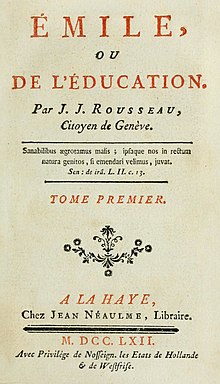HUMS 432, Interpretations: Rousseau’s Émile

A close reading of Jean-Jacques Rousseau’s masterpiece, Emile. Though the book poses as a guide to education, it has much grander aspirations; it offers a whole vision of the human condition. Rousseau called it his “best and worthiest work” and said he believed it would spark a revolution in the way that human beings understand themselves. Many historians of thought believe that the book has done just that, and that we live in the world it helped to create – a claim we consider and evaluate. Presented as a private tutor’s account of how he would arrange the education of a boy named Emile from infancy through young adulthood, the book raises fundamental questions about human nature and malleability, how we learn to be free, whether we can view ourselves scientifically and still maintain a belief in free will, whether we are need of some sort of religious faith to act morally, how adults and children, and men and women, ought to relate to one another, how the demands of social life and citizenship affect our happiness – and more. Ultimately the question at issue is whether human beings can find a way to live happily and flourish in modern societies.